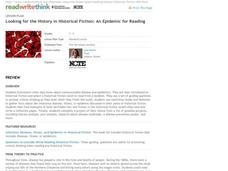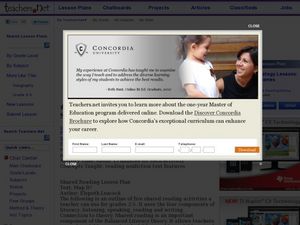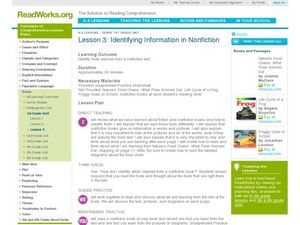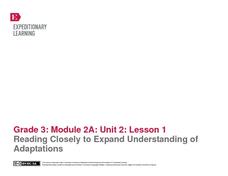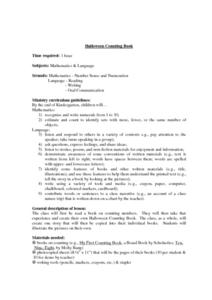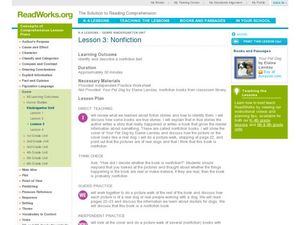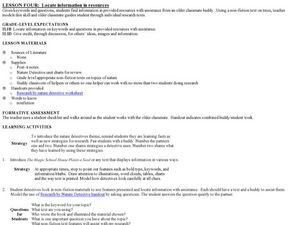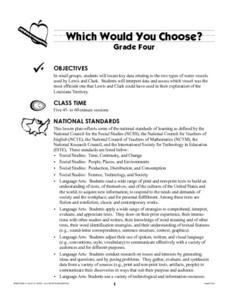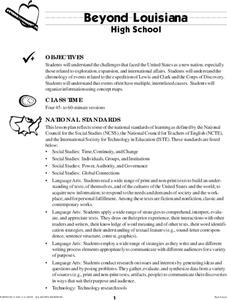Curated OER
Non-Fiction Text Features
Distinguish between textual features of non-fiction in the book The Lewis and Clark Expedition and in the non-fiction story "Ta-Na-e-Ka." Third graders create posters and participate in group discussions to show their understanding of...
ReadWriteThink
Looking for the History in Historical Fiction: An Epidemic for Reading
Combine informational reading skills with fictional text in an innovative historical fiction lessons. After reading a fictional text related to diseases, class members read non-fictional text to gain knowledge about specific infectious...
Curated OER
Using Social Studies in Five Shared Reading Lessons: Geography
After several short 15-minute mini-lessons, your learners will gain an understanding of the characteristics of a non-fiction text. Using the book Map It by Elspeth Leacock, your class will become acquainted with non-fiction terms such as...
Curated OER
Identifying Information in Nonfiction
Second graders investigate information in non-fiction texts. They review the features of a non-fiction text and read the book Nature's Food Chains: What Polar Animals Eat. Pupils discuss the text features and write down one fact they...
Ontario
Reading Informational Text
Learning to recognize the importance of the features of information text (i.e., titles, subtitles, endnotes, sidebars, etc.) is the focus of a reading activity designed for middle schoolers. Learners examine how these text features help...
Scholastic
Mixed Bags: Fiction and Nonfiction
Using a bag with one fiction and non-fiction book of similar topics, partners work together to find the differences and similarities of each story. They record their obervances in a T-chart.
Curated OER
Crater Creation
After looking at the back of a quarter featuring Oregon terrain, learners distinguish between fiction and non-fiction and identify the beginning, middle and end of a story. First, they listen to legends that describe the creation of...
Pennsylvania Department of Education
Exploring Key Ideas and Details in Fiction and Nonfiction
Third graders participate in activities to differentiate fiction from nonfiction. In this fiction activity, 3rd graders describe the elements of a fiction story. Students compare and contrast fiction and non fiction elements. Students...
EngageNY
Reading Closely to Expand Understanding of Adaptations
Third graders work to determine the main idea, recall key details, and answer questions using an informational text on the topic of animal adaptations. Using the non-fiction text "Staying Alive: Animal Adaptations" (provided) the teacher...
Curated OER
Natural Disasters: An Adventure in Non-Fiction
Students study different natural disasters. In this natural disaster lesson students read a nonfiction book followed by a discussion, an experiment, then collect illustrations from their experience.
Curated OER
Halloween Counting Book
First graders recognize and write numerals from 1 to 10. They estimate and count to identify sets with more, fewer, or the same number of objects, listen and respond to others in a variety of contexts, and take turns speaking in a...
Curated OER
Lesson 3: Nonfiction
Introduce young readers to the word of non-fiction. They examine the features found in non-fiction books such as, facts, dates, and realistic pictures. They discuss how the images in the book Your Pet Dog depict real dogs doing real...
Dream of a Nation
Writing an Analytic Essay
After researching an issue introduced in Tyson Miller's Dream of a Nation: Inspiring Ideas for a Better America, writers develop an original thesis statement and craft an analytic essay using evidence collected in their research.
Curated OER
Identifying the Theme in a Story
Students recognize Theme through the use of simple, short stories. Using Pro Quest, students begin by researching the literary element, theme, and how it can be identified. They then identify the themes in Aesop's Fables and other short...
Curated OER
Spanish & Chicano English
Students examine the history of Spanish in what is now the United States. They examine the current language status of the Hispanic population. Students are able to characterize Spanglish and Chicano English. They examine some features...
Curated OER
Locate Information in Resources
Students listen to the Magic School House Plants a Seed. In this locating information lesson, students discuss the various presentations of information in the book. Students complete a worksheet of information.
Curated OER
A River Ran Wild: An Environmental History
The Nashua River serves as the focal point of an investigation of the treatment of and care for natural resources. A reading of A River Rand Wild: An Environmental History by Lynne Cherry, launches the study and class members consider...
Curated OER
Genre Study - Grade Three
Third graders learn to identify different types of literature genres. In this genre lesson plan, 3rd graders complete pre and post- assessment, conduct a genre research activity, and complete the associated worksheets.
Curated OER
Take It Or Leave It
Third graders examine the significance of the Louisiana Purchase and the journey of Lewis and Clark, and discuss "needs" versus "wants". They listen to a story, plan for a journey like Lewis and Clark, create a list of supplies, and...
Curated OER
Life Along the Trail
Students explore the significance of the Louisiana Purchase and the journey of Lewis and Clark's Corps of Discovery. They read to explain a new topic and write to inform readers of the historic events they explored.
Curated OER
Worth a Thousand Words
First graders examine the significance of the American bison to the American Indians of the Great Plains. They create a story in pictographs in the style of American Indians of the Plains.
Curated OER
Mission Accomplished
Second graders describe the impact of certain figures in United States history, including Meriwether Lewis and William Clark. They describe experiences of early American explorers and compose narratives from the perspectives of others.
Curated OER
Which Would You Choose?
Fourth graders investigate two types of water vessels that were used by Lewis and Clark during the exploration of the Louisiana Territory. They interpret data to determine which vessel was more efficient.
Curated OER
Beyond Louisiana
Learners examine the challenges that faced the United States as a new nation, especially those related to exploration, expansion, and international affairs. They study the chronology of events related to the expedition of Lewis and Clark.



